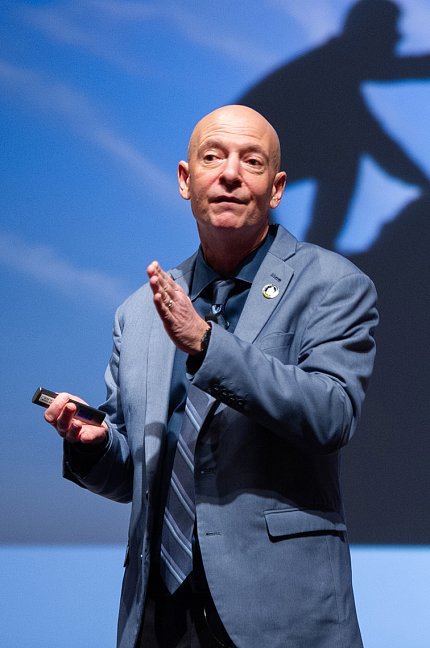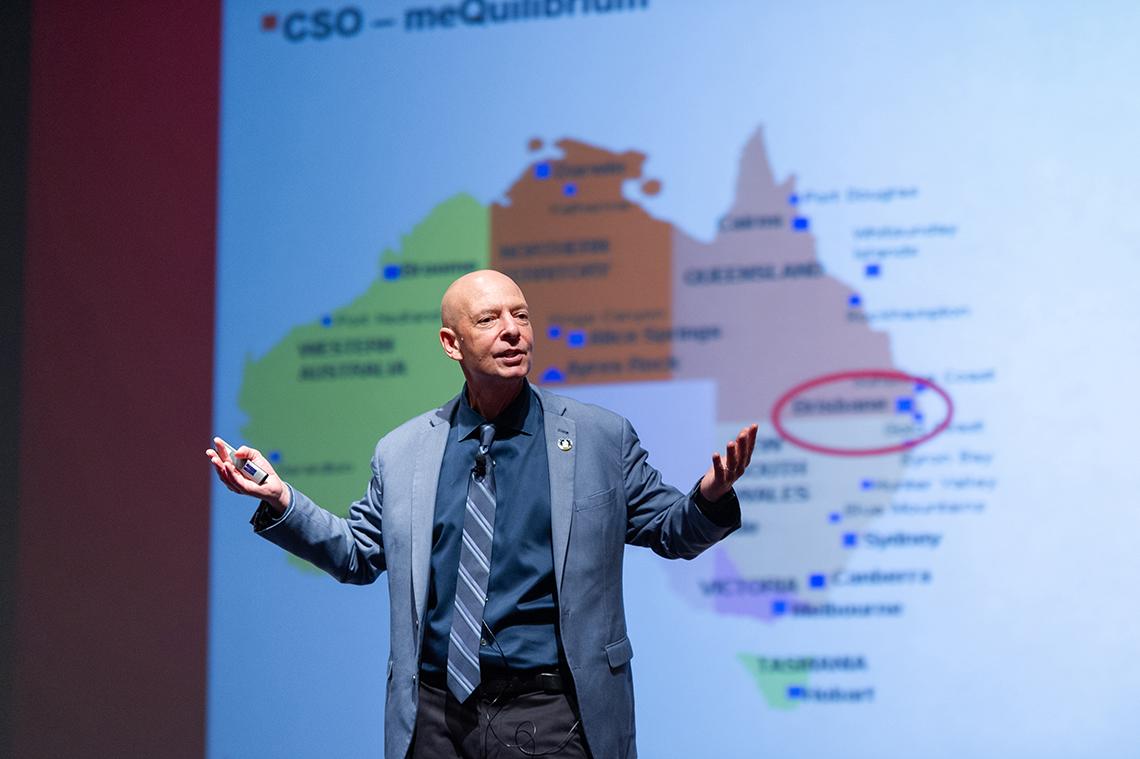The Power of Thinking
Learn How to Become a Resilient Leader, Shatté Advises

Photo: Marleen Van Den Neste
Sometimes we’re our own worst enemy, focusing on the negative, feeling overly frustrated or anxious, projecting defeat. It’s an outlook that can lead to depression and burnout. One antidote is resilience, a competency and a mindset that sets us up for success.
“How we think is the most powerful predictor of how resilient we’re going to be,” said Dr. Andrew Shatté, author and research professor, University of Arizona School of Medicine. “More than any other factor—more than education, experience or training—it’s resilience that determines who succeeds and who fails.”
Shatté, who also is founder and president of the consulting and training firm Mindflex, LLC, delivered a motivational, entertaining lecture recently to a packed Masur Auditorium as part of the Deputy Director for Management seminar series.
Resilience is a trait we admire in people who have gone through great change or adversity or who have persisted toward achieving major feats. It arises in trailblazers who didn’t lose hope, who kept trying until they finally solved a problem, got an invention to work or won the race.
Shatté has devoted much of his career to developing programs that encourage resilience in children, college students and the corporate workforce. Over the last 13 years, he also has studied resilience in the federal government. His surveys show that federal employees are typically more resilient, with higher job satisfaction, than their private sector counterparts, though optimism has waned recently due to fiscal cliffs and furloughs.
Anyone can learn to become more resilient, said Shatté. It takes perseverance, optimism and flexibility. It also takes empathy, which helps us strengthen the meaningful relationships and networks that can sustain us through hard times.
Another key ingredient is learning to keep emotions in check. Getting too emotional, he said, interferes with goals and erodes resilience.
To illustrate his point, Shatté engaged the audience in a word-jumble activity. He posted a series of anagrams, asking the audience to try to unscramble the words. Afterward, he asked who felt frustrated, anxious, angry or embarrassed going through the exercise because, it turned out, only one of the words was solvable. The exercise, he said, was intended to demonstrate the power of thinking style: when we have setbacks, we can choose to languish or to motivate ourselves to tackle the challenge.
“These emotion radars rob us of our emotion regulation, which is a critical piece of the resilience puzzle,” said Shatté.
In one psychology study, noted Shatté, undergraduates were given hundreds of unsolvable anagrams followed by a simple puzzle. Nearly two-thirds of the students, despondent from the previous anagram exercise, could not solve the easy puzzle.
Recognize defeatist thoughts early, said Shatté. “Once they get out of our heads and we’re looking at them more objectively, as scientists should, then we can recognize them for what they are: a perception based on habit and not an index of who we are.”
Studies among children have shown the benefits of learning to stay calm under pressure. In the NIMH-funded Penn Resilience Program, begun in the early 1990s, findings from more than 30 controlled trials involving hundreds of thousands of children showed that building resilience by conquering their thinking styles made kids more resistant to depression.
One gauge of resilience is a person’s “why style,” said Shatté. Do we blame others and the circumstances, or do we blame ourselves in the moment, realizing there are variables we can change to improve the outcome?
For example, asking why a child is failing math could produce a range of answers such as: I’m terrible at math; the exam was too hard; the teacher hates me; or I didn’t study hard enough. The last answer, said Shatté, shows the greatest flexibility. The “it’s me, but not always, not every time” mentality reduces the propensity for depression, workplace impairment, absenteeism and the likelihood of quitting.

Photo: Marleen Van Den Neste
Positivity improves productivity and reduces chronic stress, said Shatté, yet our brains seem hardwired toward the negative.
“We don’t savor the positive to the same degree that we live and experience the negative,” said Shatté. “We try to advocate for people to rebuild and refresh their resilience by recalibrating their minds so they’re focusing on the positive.”
When work matters, when people feel they’re contributing to something larger than themselves, as so many federal employees do, this breeds resilience.
“When we become more resilient,” said Shatté, “we can challenge the thinking that leads us to fail and take opportunities and challenges that come our way...I do believe the most significant wellspring of resilience is a life of meaning, mission and purpose.”
Shatté then rattled off a long list of NIH research accomplishments, after which he noted that the examples were just some of what’s been achieved in the last 5 years. He also said NIH’s numbers in federal employee surveys were quite high in such variables as emotion regulation and empathy but, similar to other federal employees, a little lower on optimism.
“It reflects the fact that we can maintain a sense of resilience under great stress and pressure if we’re doing something for the right reasons,” said Shatté. “Hold on to this sense of meaning because it is everything.”
